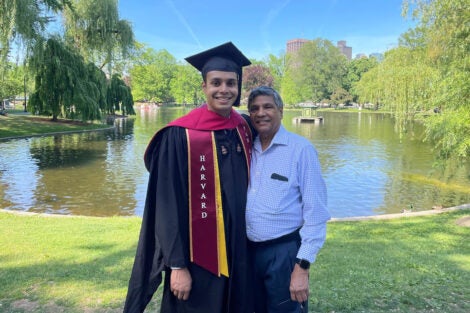By Joshua Budhu, MPH ’22
February 8, 2024 — As a neuro-oncologist focused on health equity, I understand the many reasons behind disparities in cancer outcomes by race and income. Yet it’s one thing to understand those reasons intellectually. It’s another to see them play out within your own family. My dad was diagnosed with metastatic prostate cancer in 2018. His journey illuminates the many obstacles that patients of color and low-income patients face in securing timely diagnosis, thoughtful follow-up, and high-quality cancer care.
My father, Robert, is a retired real estate agent and a proud Guyanese immigrant who sacrificed so that his children could live a better life. In 2015, his primary care physician (PCP) noticed he had trouble urinating and ordered a prostate-specific antigen (PSA) test. It came back elevated. His PCP was suspicious of prostate cancer, given his age and symptoms. Prostate cancer is usually slow-growing, so his PCP planned “active surveillance”—watching it both clinically and with diagnostic testing. Then my dad lost his health insurance and switched to a different Medicaid plan, which his PCP did not accept.
In the jargon of the medical industry, my father became “lost to follow-up.”
This is not uncommon, especially for racial and ethnic minorities and patients who are on Medicaid. While Medicaid has improved access for millions of Americans, many hospitals and clinicians don’t accept it because of lower reimbursement rates. Even when a site does accept Medicaid, it may only accept one or two out of a dozen Medicaid plans. This restricts access to care; it’s well-documented that Medicaid patients have a much harder time scheduling appointments than patients with private health insurance.
Making matters worse, patients must regularly recertify their eligibility for Medicaid, a cumbersome process that often leads to them losing insurance for months or years at a time, especially now with the unwinding of continuous coverage rules implemented during the COVID-19 pandemic.
This discontinuity of care leads to worse health outcomes, especially for cancer.
My dad experienced the discontinuity first-hand; he had trouble finding a new PCP and waited more than a year for a new appointment, while his symptoms worsened. In 2018, a new PSA test came back with results 10 times higher than the prior test. A biopsy of his prostate revealed a poorly differentiated cancer with a “Gleason score” of 8, which indicated an aggressive form of prostate cancer. His urologist wanted to start him on therapy within the next few weeks, but when I looked at my dad’s records, I saw that the diagnostic workup was incomplete, and the proposed treatment was not in line with the latest science.
Again, this is not uncommon. Patients with Medicaid, those who are eligible for both Medicare and Medicaid, and those with no insurance have a lower chance of receiving appropriate, evidence-based treatment. Cancers with certain genetic biomarkers can now be treated with targeted therapies, which cause fewer side effects. But Black patients and those with government insurance are less likely to be tested for those biomarkers. And even when a biomarker is found, targeted treatment is not always offered. A recent study found that up to 33% of Medicaid patients eligible for newer, less toxic treatments for lung cancer were not offered them—even though they are now considered first-line therapy.
In my dad’s case, disillusioned with his urologist, I insisted that he transfer to a comprehensive cancer center—a process that took another month because of insurance barriers. Once he was in the system, he was staged correctly, found to have widespread bone metastases, and started on a newer treatment regimen. His PSA is now undetectable, and his cancer is in remission. But he had a substantial treatment delay. What would have happened if the cancer had spread further, to his other organs?
Unfortunately, my dad’s story isn’t unique.
Racial and ethnic minorities, who make up a large percentage of Medicaid patients and are disproportionally affected by the social determinants of health, have lower rates of appropriate cancer screening. When they are diagnosed with cancer, treatment regimens may not be appropriate and there are significant delays to care. Far too often, your health insurance status or your race determine if you’re offered biomarker testing or access to comprehensive cancer centers, which can provide additional treatment options, such as clinical trials.
These structural barriers are embedded in our health care system. Unless we address them, millions of marginalized patients will continue to be “lost to follow-up.”
Joshua A. Budhu is a neuro-oncologist at Memorial Sloan Kettering Cancer Center. He holds an MPH in health policy from Harvard Chan School, an MD from Morehouse School of Medicine, an MS in biomedical sciences from Rosalind Franklin University and was a 2021-2022 Commonwealth Fund Fellow in Minority Health Policy at Harvard.
Photo: Courtesy of Joshua Budhu
